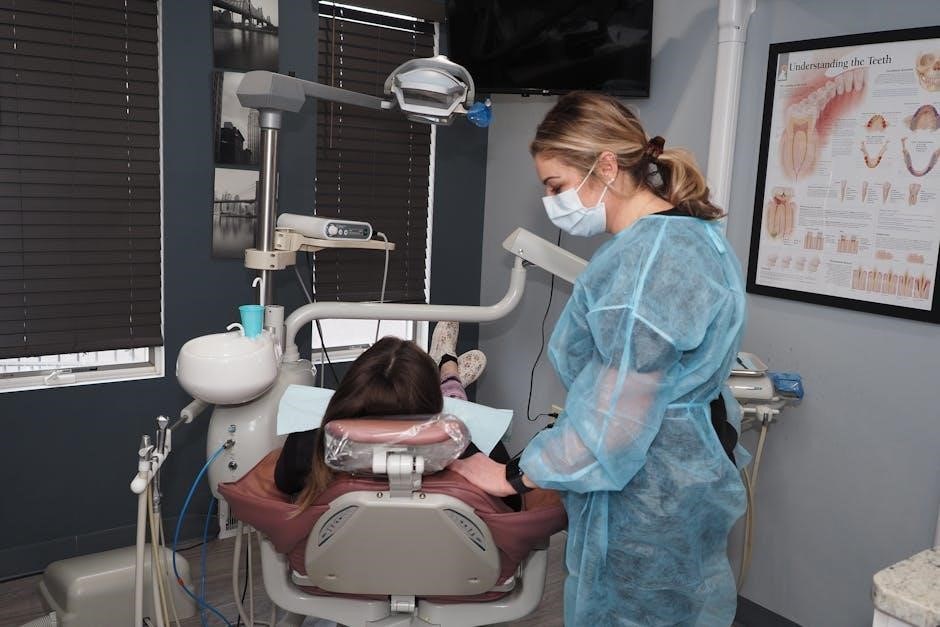The Mini Mental State Examination (MMSE) is a widely used 30-point assessment tool developed in 1975. It evaluates cognitive functions such as orientation, memory, attention, and language, aiding clinicians in identifying cognitive impairments, particularly in dementia cases. The NHS recommends it as a primary tool for assessing cognitive impairment in dementia, providing a practical method for grading cognitive states in clinical settings.
1.1 Definition and Purpose
The Mini Mental State Examination (MMSE) is a standardized, 30-point assessment tool designed to evaluate cognitive function. It systematically measures domains such as orientation, memory, attention, and language. Primarily used in clinical settings, the MMSE helps identify and grade cognitive impairment, particularly in dementia cases. Its purpose is to provide a quick, reliable method for clinicians to assess mental status and monitor changes over time. The NHS endorses the MMSE as a key tool for evaluating cognitive impairment in dementia, emphasizing its role in early detection and ongoing patient management. It remains a cornerstone in both clinical practice and research.
1.2 Historical Background and Development
The Mini Mental State Examination (MMSE) was first introduced in 1975 by Marshal F. Folstein, Susan Folstein, and Paul R. McHugh. Initially published in the Journal of Psychiatric Research, it was designed as a practical method for clinicians to grade cognitive impairment. The tool quickly gained acceptance due to its simplicity and effectiveness in assessing mental status. Over time, the MMSE has undergone minor revisions while maintaining its core structure. Its widespread adoption in clinical practice and research solidified its role as a standard cognitive assessment tool. The NHS later endorsed the MMSE, integrating it into guidelines for evaluating cognitive impairment in dementia.
1.3 Importance in Clinical Practice
The Mini Mental State Examination (MMSE) holds significant importance in clinical practice as a standardized tool for assessing cognitive impairment. It is widely used to detect early signs of dementia, monitor disease progression, and evaluate treatment responses. The MMSE provides a quick and reliable measure of cognitive function, aiding clinicians in making informed decisions. Its simplicity and effectiveness make it a cornerstone in geriatric and psychiatric care. The NHS endorses the MMSE as a primary assessment tool, highlighting its role in identifying cognitive decline and guiding appropriate interventions. This tool is invaluable for healthcare professionals in both clinical and research settings.

Structure and Content of the MMSE
The MMSE is a 30-point assessment evaluating orientation, memory, attention, language, and praxis. It systematically measures cognitive function through structured questions and tasks, ensuring comprehensive evaluation.
2.1 Cognitive Domains Assessed
The MMSE evaluates five primary cognitive domains: orientation, memory, attention, language, and praxis. Orientation assesses awareness of time, place, and person. Memory tests recall of words and events. Attention measures the ability to perform calculations and follow commands. Language evaluates naming, repetition, reading, and writing. Praxis involves copying designs, ensuring motor and cognitive integration. Each domain provides insights into cognitive function, aiding in early detection of impairments and monitoring progression. The structured approach ensures a comprehensive evaluation, making it a valuable tool in clinical practice.
2.2 Breakdown of the 30-Point Scoring System
The MMSE scoring system allocates points across five cognitive domains, totaling 30. Orientation is worth 10 points, assessing time, place, and person. Memory accounts for 6 points, testing recall of three words. Attention and calculation contribute 5 points, evaluating serial sevens or similar tasks. Language, including naming, repetition, reading, and writing, totals 8 points. Praxis, involving design copying, adds 1 point; Higher scores indicate better cognitive function, with 24-30 considered normal, 18-23 mild impairment, and below 10 severe impairment. This structured scoring aids in objective assessment and tracking of cognitive changes over time.
2.3 Key Components of the Examination
The MMSE consists of five key components: orientation, memory, attention, language, and praxis. Orientation assesses awareness of time, place, and person, with specific questions about the year, season, date, day, and month. Memory evaluates the ability to recall three words, while attention tests concentration through tasks like serial sevens or spelling “WORLD” backward. Language includes naming objects, repeating phrases, reading, and writing sentences. Praxis involves copying a geometric design. Each section is designed to systematically evaluate cognitive function, ensuring a comprehensive assessment of mental status. These components provide a structured framework for clinicians to identify impairments effectively.

Administration and Scoring Guidelines
The MMSE is a 30-point assessment tool evaluating orientation, memory, attention, language, and praxis. Scoring guidelines and NHS PDF resources provide standardized administration and interpretation criteria.
3.1 Instructions for Administering the MMSE
The MMSE is administered by trained healthcare professionals to assess cognitive function. Begin with orientation questions, asking for the date, season, and location. Score one point for each correct answer. Next, test memory by naming three objects and asking for recall. Attention is evaluated using tasks like serial sevens or spelling backwards. Language is assessed through naming objects, repetition, and reading commands. Praxis involves drawing shapes or following commands. Ensure the patient has adequate vision and hearing. Allow 10 seconds for each response. Do not prompt or correct errors during the test. Maintain a neutral and supportive demeanor to ensure accurate results.
3.2 Scoring Criteria and Interpretation
The MMSE is scored out of 30, with higher scores indicating better cognitive function. A normal score is 24-30, while scores below 24 suggest cognitive impairment. Mild impairment is 18-23, moderate impairment is 11-17, and severe impairment is 0-10. Each section (orientation, memory, attention, language, and praxis) is scored separately, with specific criteria for each task. For example, orientation questions award one point per correct answer, while memory recall awards points for each correctly named object. Interpretation considers the total score, with lower scores correlating with greater cognitive decline. Cultural and educational biases may affect results, requiring careful interpretation.
3.4 Common Pitfalls in Administration
Common pitfalls in MMSE administration include improper test setup, rushing the patient, and scoring errors. Ensuring the paper is placed centrally, not favoring one hand, is crucial. Allowing ten seconds for each response and avoiding prompts can prevent inaccurate scores; Scorers must ask all questions in sequence and score each part correctly. Cultural and educational biases may also affect results, requiring careful interpretation. Proper training is essential to avoid these pitfalls and ensure reliable, consistent assessments. Adhering to guidelines helps maintain the validity and accuracy of the MMSE in clinical and research settings.

Clinical Applications of the MMSE
The MMSE is widely used in clinical settings to assess cognitive impairment, particularly in diagnosing dementia, monitoring disease progression, and aiding in research studies. It provides valuable insights into a patient’s cognitive state, helping clinicians make informed decisions about treatment and care plans. Its simplicity and effectiveness make it a cornerstone in both primary and specialized healthcare settings, supporting early detection and management of cognitive decline.
4.1 Use in Diagnosing Dementia
The MMSE is a key tool in diagnosing dementia, providing insights into cognitive impairments. It assesses orientation, memory, attention, and language, with scores ranging from 0 to 30. A score of 24 or higher typically indicates normal cognitive function, while lower scores suggest impairment. The NHS recommends the MMSE as a primary assessment for dementia, aiding clinicians in identifying early signs of cognitive decline. While not diagnostic on its own, the MMSE helps guide further evaluations and supports comprehensive diagnostic processes for dementia.
4.2 Monitoring Disease Progression
The MMSE is valuable for monitoring the progression of cognitive decline in individuals with dementia. Regular administration allows clinicians to track changes in cognitive function over time. Scores can indicate the rate of decline, helping to assess disease severity and progression. This tool is particularly useful in clinical settings to evaluate the effectiveness of interventions and guide treatment adjustments. While not diagnostic, the MMSE provides longitudinal data, enabling healthcare providers to make informed decisions about patient care and management. Its simplicity and widespread use make it a practical choice for ongoing monitoring in both clinical and research contexts.
4.3 Role in Clinical Research
The MMSE plays a significant role in clinical research, particularly in studies evaluating cognitive impairment and dementia interventions. Its widespread use establishes a standardized method for assessing cognitive function, enabling researchers to measure changes over time. The MMSE is often used to track the effectiveness of treatments and interventions in clinical trials. Its simplicity and reliability make it a valuable tool for researchers to collect consistent data across diverse populations. Additionally, the MMSE has been used to validate other cognitive assessments and to establish diagnostic accuracy in research settings. Its adaptability and availability, including NHS PDF resources, further support its utility in clinical research.

The MMSE in NHS Practice
The MMSE is a primary tool recommended by the NHS for assessing cognitive impairment in dementia. It provides a standardized method to evaluate orientation, memory, attention, and language, aiding clinicians in early detection and monitoring of cognitive decline. Its practicality and reliability make it a cornerstone in NHS clinical practice for diagnosing and managing dementia effectively.
5.1 NHS Guidelines for MMSE Usage
The NHS endorses the MMSE as a primary tool for assessing cognitive impairment in dementia. It is a 30-point questionnaire evaluating orientation, memory, attention, and language. The NHS guidelines emphasize its use in clinical practice for early detection and monitoring of cognitive decline. Administration instructions include standardized procedures to ensure reliability, such as not holding materials too close to the patient. Scoring criteria are clearly defined, with specific points allocated for each task. The NHS recommends the MMSE as part of a comprehensive assessment for diagnosing and managing dementia, ensuring consistent and accurate evaluations across healthcare settings.
5.2 Availability of MMSE NHS PDF Resources
The MMSE NHS PDF resources are widely accessible through official NHS channels and trusted medical websites. The NHS provides downloadable PDF versions of the MMSE, including guidelines for administration and scoring. These resources are available on the official NHS website and platforms like ResearchGate. Additionally, the MMSE_NHS_Patient_Assessment_Form.pdf and MMSE_Scoring_Guidelines_NHS.pdf are popular downloads. Healthcare professionals can also access these materials through clinical guidelines and training programs. These PDFs ensure standardized practice, making the MMSE a reliable tool for cognitive assessment in clinical settings.
5.3 Training and Certification for Healthcare Professionals
Healthcare professionals can access training and certification programs to master the MMSE. The NHS offers structured workshops and online courses, ensuring standardized administration and scoring. These programs cover test mechanics, interpretation of results, and common pitfalls. Certification is essential for maintaining reliability and consistency in cognitive assessments. Many NHS trusts provide internal training, while external organizations offer accredited MMSE certification. These resources ensure healthcare providers are proficient in using the MMSE effectively, enhancing patient care and diagnostic accuracy across clinical settings.

Scientific Evidence and Validation
The MMSE has robust scientific validation, with studies confirming its diagnostic sensitivity and specificity in assessing cognitive impairment. Its reliability and validity are well-documented in clinical research.
6.1 Diagnostic Sensitivity and Specificity
The MMSE demonstrates strong diagnostic sensitivity and specificity in identifying cognitive impairment, particularly in dementia. Studies show it accurately distinguishes between individuals with and without cognitive deficits, making it a reliable screening tool. Its ability to detect early changes in cognitive function supports its widespread use in clinical practice. The MMSE’s effectiveness in assessing dementia has been validated across diverse populations, ensuring its utility as a primary diagnostic instrument in both clinical and research settings.
6.2 Reliability and Validity Studies
The MMSE has undergone extensive reliability and validity studies, confirming its effectiveness as a cognitive assessment tool. Research demonstrates high test-retest reliability, ensuring consistent results across administrations. Inter-rater reliability is also strong, with minimal variability between examiners. Validity studies have shown the MMSE accurately reflects cognitive impairment, particularly in dementia. While it may have limitations in certain populations, its standardized administration and scoring system contribute to its robust reliability. These studies establish the MMSE as a dependable instrument for assessing cognitive function, making it a benchmark in clinical and research settings for evaluating mental status.
6.3 Comparison with Other Cognitive Assessments
The MMSE is often compared to other cognitive assessments like the Mini-Addenbrooke’s Cognitive Examination (ACE) and the Montreal Cognitive Assessment (MoCA). While the MMSE is concise and widely used, tools like the ACE offer more comprehensive evaluations, including executive function. The MoCA is noted for its sensitivity to mild cognitive impairment, an area where the MMSE has limitations. Each tool has its strengths, with the MMSE excelling in brevity and ease of administration, making it ideal for quick screenings. However, for deeper cognitive assessments, especially in early or subtle impairments, alternative tests may be more appropriate.
Limitations and Criticisms
The MMSE has cultural and educational biases, affecting its reliability across diverse populations. It also exhibits ceiling effects in high-functioning individuals and lacks sensitivity to mild cognitive impairment.
7.1 Cultural and Educational Biases
The MMSE exhibits cultural and educational biases, impacting its reliability across diverse populations. Individuals with lower educational backgrounds or non-English speaking origins may score poorly, not due to cognitive impairment but due to unfamiliarity with test content. This limitation can lead to overestimation of cognitive deficits, particularly in minority groups. The test’s reliance on language and education-specific tasks, such as reading and writing, further exacerbates these biases. NHS guidelines emphasize the need for cultural sensitivity, but the MMSE’s design often fails to account for these factors, potentially leading to inaccurate assessments in clinical practice.
7.2 Ceiling Effects in High-Functioning Individuals
The MMSE often exhibits ceiling effects in high-functioning individuals, limiting its ability to detect subtle cognitive differences. Many patients with mild cognitive impairment or high baseline cognitive function score near the maximum of 30, reducing the test’s sensitivity to subtle changes or impairments. This makes it less effective for monitoring progression in early or mild cases. The test’s simplicity and lack of challenging items for high-functioning individuals contribute to this limitation, emphasizing the need for complementary assessments in clinical practice to ensure accurate evaluations of cognitive status.
7.3 Lack of Sensitivity to Mild Cognitive Impairment
The MMSE has limited sensitivity in detecting mild cognitive impairment (MCI), often failing to identify early or subtle cognitive deficits. Patients with MCI may score within the normal range (24-30), as the test focuses on moderate to severe impairment. This limitation arises from its emphasis on basic cognitive functions rather than higher-order tasks. Consequently, the MMSE is less effective in early detection and monitoring of MCI, highlighting the need for more nuanced assessments in clinical practice to address this gap in cognitive evaluation and ensure timely intervention for individuals at risk of progression to dementia.
Ethical Considerations
Ethical considerations in the MMSE involve ensuring patient consent, maintaining confidentiality, avoiding stigma, using results ethically, and respecting patient dignity throughout the assessment process.
8.1 Patient Consent and Confidentiality
Patient consent and confidentiality are paramount when administering the MMSE. Informed consent must be obtained, ensuring patients understand the purpose and use of the assessment. Confidentiality is maintained by adhering to data protection laws, such as GDPR, and NHS guidelines. Results should only be shared with authorized healthcare professionals. Patients have the right to refuse participation or withdraw at any time. Ensuring privacy during the examination is essential to avoid discomfort or stigma. Handling results sensitively is crucial to respect patient dignity and confidentiality, aligning with ethical healthcare practices.
8.2 Avoiding Stigma in Cognitive Assessment
Avoiding stigma in cognitive assessment is crucial to ensure patients feel comfortable and respected. The MMSE should be administered in a private, non-judgmental setting to minimize embarrassment. Healthcare professionals must use clear, empathetic communication to explain the purpose of the assessment, emphasizing its role in diagnosis and care planning. Patients should be reassured that the MMSE is a tool to help, not stigmatize. Cultural and educational biases should be considered to ensure fairness. By fostering a supportive environment, clinicians can reduce anxiety and promote a positive experience, aligning with person-centered care principles advocated by the NHS.
8.3 Ethical Use of MMSE Results
The ethical use of MMSE results is paramount to ensure patient trust and dignity. Clinicians must obtain informed consent before administering the MMSE, explaining its purpose and how results will be used. Results should be interpreted within the context of the patient’s overall clinical picture, avoiding oversimplification. Confidentiality must be maintained, with results shared only with authorized healthcare professionals. The NHS emphasizes that MMSE scores should not be used to stigmatize or discriminate but rather to guide appropriate care and support. Ethical practice also involves avoiding misuse of results for non-clinical decisions, ensuring transparency, and respecting patient autonomy throughout the process.

Accessing MMSE Resources
Official MMSE NHS PDFs are available for download, offering structured assessments. Unofficial sources provide alternative versions, while printable templates ensure accessibility for clinical and research purposes.
9.1 Official MMSE NHS PDF Downloads
The official MMSE NHS PDF is a standardized resource provided by the National Health Service. It includes detailed instructions for administration and scoring, ensuring consistency across clinical settings. The PDF outlines the 30-point assessment, covering orientation, memory, attention, and language. Healthcare professionals can download it directly from NHS-approved websites, such as NHCQF, ensuring authenticity and reliability. This document is essential for clinicians to accurately evaluate cognitive impairment and monitor disease progression in patients. Regular updates and guidelines are also included to reflect current clinical practices and standards.
9.2 Unofficial but Reliable Sources
Beyond official NHS resources, several unofficial yet reliable sources offer MMSE templates and guides. Websites like ResearchGate and academic platforms provide downloadable PDFs, often aligned with NHS standards. These sources include detailed scoring instructions, sample questions, and administration guidelines. While not endorsed by the NHS, they are widely used in clinical and educational settings. They ensure accessibility for professionals without NHS access, maintaining the tool’s integrity and usability. These resources are particularly useful for training purposes and offer flexibility in various clinical environments, supporting consistent cognitive assessments globally.
9.3 Printable MMSE Templates
Printable MMSE templates are widely available online, offering a convenient format for clinical use. These templates typically include all 30 points of assessment, covering orientation, memory, attention, language, and visuospatial skills. Many versions are designed to mirror the official NHS MMSE PDF, ensuring consistency and accuracy. They often include administration instructions and scoring guidelines, making them user-friendly for healthcare professionals. Websites like ResearchGate and other academic platforms provide downloadable templates, which are invaluable for training and practical applications. These printable resources facilitate quick and reliable cognitive assessments in various clinical settings, maintaining the standardized approach of the MMSE.
The MMSE remains a cornerstone in cognitive assessment, offering a simple yet effective tool for diagnosing dementia and monitoring progression. Its versatility and established validity ensure its continued relevance in clinical practice and research.
10.1 Summary of Key Points
The Mini Mental State Examination (MMSE) is a 30-point cognitive assessment tool widely used in clinical practice. It evaluates orientation, memory, attention, and language, aiding in dementia diagnosis and monitoring. The NHS endorses the MMSE as a primary tool for assessing cognitive impairment, with official PDF resources available for healthcare professionals. Scoring ranges from 0 to 30, with higher scores indicating better cognitive function. Training and certification are essential for accurate administration and interpretation. The MMSE’s simplicity and established validity make it a cornerstone in both clinical and research settings, ensuring its continued relevance in assessing cognitive health.
10.2 Future Directions for the MMSE
Future directions for the MMSE include integrating digital platforms to enhance accessibility and standardization. Efforts to address cultural and educational biases are crucial for improving validity across diverse populations. Expanding the tool’s sensitivity to detect mild cognitive impairment and earlier stages of dementia is another priority. Collaboration between the NHS and researchers could lead to updated versions tailored to modern clinical needs. Additionally, leveraging technology for remote administration and automated scoring may increase efficiency in healthcare settings. These advancements aim to maintain the MMSE’s relevance as a reliable and practical tool in cognitive assessment and dementia care.
